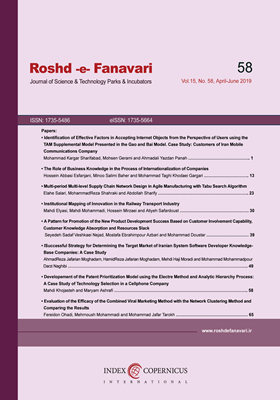بررسی تأثیر دانش بازرگانی بر فرایند بینالمللیشدن کسب و کارها
الموضوعات : Knowledge Management
حسین عباسی اسفنجانی
1
![]() ,
مینو سلیمی باهر
2
,
محمدتقی خدایی گرگری
3
,
مینو سلیمی باهر
2
,
محمدتقی خدایی گرگری
3
1 - گروه مدیریت، اقتصاد و حسابداری، دانشگاه پیام نور، ایران
2 - دانشگاه پیام نور، تهران، ایران
3 - دانشگاه تهران-پتروشیمی تبریز
الکلمات المفتاحية: بینالمللیشدن دانش بازرگانی دانش کسب و کار الگوی دانش عناصر دانش,
ملخص المقالة :
پژوهش حاضر با هدف شناسایی عناصر دانش بازرگانی که در فرایند بینالمللیشدن کسب وکارها نقش حیاتی دارند، انجام گردیده است. برای دستیابی به هدف پژوهش، ابتدا با بررسی و مرور ادبیات، الگوی دو بعدی بارتا بدلیل جامعیت و استفاده مکرر آن در پژوهشهای قبلی بعنوان چارچوب مفهومی پژوهش انتخاب گردید. سپس، با روش تحقیق توصیفی- پیمایشی دادههای مورد نیاز با استفاده از ابزار پرسشنامه از مدیران و کارشناسان بخش بازرگانی خارجی (صادرات و واردات) 104 شرکت از بین پنج نوع متفاوت کسب و کار در استان آذربایجانشرقی جمعآوری و با آزمونهای همبستگی کرامر، رگرسیون لجستیک و همبستگی اسپیرمن تجزیه و تحلیل شد. یافتههای تحقیق نشان میدهد که تمام متغیرهای شایستگی فردی کارکنان، باورها و عادات سازمانی و رویههای شرکت با شاخص شدت بینالمللیشدن کسب و کارها ارتباط دارند. لیکن قویترین ارتباط میان بینالمللیشدن و عناصر مختلف دانش کسب و کار، در حوزه باورها و عادات سازمانی و شایستگی فردی کارکنان شناسایی گردید.
1- فقیهی، ابوالحسن؛ تاج الدین مهدي و تاج الدین مهران. بین المللی شدن کسب و کارهاي کوچک و متوسط در صنعت غذایی: ارائه یک مدل علّی. فصلنامه علوم مدیریت ایران، سال پنجم، شماره 17، بهار 1389، ص 22 – 1.
2- عباسی اسفنجانی، حسین و سلیمی باهر، مینو. بازرگانی بین¬الملل و صادرات. انتشارات تبریز، 1397، زیر چاپ.
3- ولی بحرینی، حسین و خیاط مقدم، سعید. شناسایی عوامل موثر بر نوآوري مبتنی بر دانش با روش دلفی. سومین کنفرانس بین¬المللی پژوهشهاي نوین در مدیریت- اقتصاد و حسابداري، استانبول، 1394.
4- سرمد، زهره؛ بازرگان، عباس و حجازی، الهه. روش های تحقیق در علوم رفتاری. چاپ یازدهم، انتشارات آگاه، 1384.
5- Davenport, T., & Grover, V. Knowledge Management. Journal of Management Information Systems, 18(1), 3-4, 2001.
6- Wickramasinghe, N. The Phenomenon of Duality: The Key to Facilitating the Transition form Knowledge Management to Wisdom for Inquiring Organizations. In Courtney et al. (Eds.), Inquiring organizations: Moving form Knowledge Management to Wisdom. Hershey, PA: Idea Group Publishing, 2005.
7- Naisbitt, J. Megatrends. Ten New Directions Transforming Our Lives. New York: Warner Books, 1982.
8- Polanyi, M. The Tacit Dimension. London: Routledge and Kegan, 1966.
9- Lundvall, Bengt-Åke; Rasmussen, Palle; Lorenz Edward. Education in the Learning Economy; a European perspective, Policy Futures in Education, Vol. 6, No. 6, 2008.
10- Sveiby, K. E. The New Organizational Wealth. San Francisco: Berrett-Koehler Publishers, 1997.
11- Starbuck, W. H. Learning by knowledge intensive firms. Journal of Management Studies, 29 (6), 713-740, 1992.
12- March, J. G., & Levitt, B. Organizational learning. Annual Review of Sociology, 14, 319-338, 1988.
13- Kuwada, K., & Asaba, S. The continuous side of discontinuity. Tokyo Metropolitan University - Journal of the Faculty of Economics, 63, 1989.
14- Bartha, Z. & Gubik, A.S. The Role of Business Knowledge in the Internationalisation Process of Hungarian Corporations (chapter 6), 2014.
15- Rowley, J. Partnering Paradigms? Knowledge management and relationship marketing. Industrial management & Data Systems,104, PP:149-157, 2004
16- Rasooli, P. Knowledge management in call centers. Master Thesis, Lulea University of Technology, 2006.
17- Naidu, G. M., Cavusgil, T., Kinnera, S., & Murthy, B. (1997). An export promotion model for India: Implications for public policy. International Business Review, 6(2), 113-125.
18- Johanson, J., & Wiedersheim-Paul, F. The Internationalization of the Firm. Four Swedish Cases. In: Buckley, P., & Ghauri, P.N. (eds.) (2006): The Internationalization of the Firm. New York: International Thomson Business Press, 2006.
19- Wach, K. Theoretical Framework of the Firm-Level Internationalisation in Business Studies (chapter 1), In: Duréndez, A., & Wach, K. (2014). Patterns of Business Internationalisation in Visegrad Countries – In Search for Regional Specifics. Cartagena: Politencina Universitad de Cartagena, pp. 13-30, 2014.
20- Johanson, J., & Vahlne, J.E. The Mechanism of Internationalisation. International Marketing Review, 7(4), 11-24, 1990.
21- Muhammad, A., Syed Zulfiqar, A. S., Sher, Z. K., "The role of personality in SMEs internationalization: empirical evidence", Review of International
Business and Strategy, Vol. 28 Issue: 2, pp.258-282, 2018, https://doi.org/10.1108/RIBS-12-2017-0113 22- Katerina, K., Emmanuella, P., Tanja, L., "Family business internationalization and networks: emerging pathways", Journal of Business & Industrial
Marketing, Vol. 32 Issue: 3, pp.357-370, 2017, https://doi.org/10.1108/JBIM-04-2015-0066 23- Reid, S.D. The Decision-Maker and Export Entry and Expansion. Journal of International Business Studies, 12, 101–112, 1981.
24- Cavusgil, S.T., & Knight, G. Born global firms – A new international enterprise. New York: Business Expert Press, LCC, 2009.
25- Johanson, J., & Mattsson, L.G. Interorganizational relations in industrial systems: a network approach compared with the transaction cost approach. International Studies of Management & Organization 17(1), 34, 1987.
26- Gubik, A.S. & Karajz, S. The Choice of Foreign Market Entry Modes – The Role of Resources and Industrial Driving Forces. Entrepreneurial Business and Economics Review, 2 (1), 2014.
27- Barkema, H., Bell, J.H., & Pennings, J.M. Foreign Entry, Cultural Barriers, and the experience factor in foreign market entry behavior of service firms. Learning. Strategic Management Journal, 17, 151-166, 1996.
28- Hitt, M.A., Bierman, L., Uhlenbruck, K., & Shimizu, K. The Importance of Resources in the Internationalization of Professional Service Firms: The Good, the Bad and the Ugly. The Academy of Management Journal 49(6), 1137-1157, 2006.


